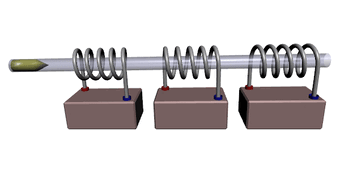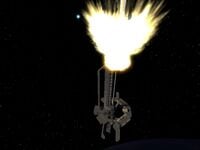Magnetic Accelerator Cannon
From Halopedia, the Halo wiki
| This article does not meet the wiki's general standards and/or standards on layouts. You can help by cleaning this article. |
- "That MAC gun can put a round clean through a Covenant capital ship."
- — Sergeant Johnson, talking to the Master Chief on board the Orbital Defense Platform Cairo.
The Magnetic Accelerator Cannon, also known as Mass Accelerator Cannon[1], or the MAC Gun or MAC Cannon, is a large coilgun that serves as the primary offensive weapon for UNSC warships.
A larger variant is in service aboard Orbital Defense Platforms. Within the UNSC arsenal, only nuclear ordnance exceeds the power of the MAC. The M68 Gauss Cannon used by UNSC ground forces mounted on some Warthogs may be regarded as a relative of the MAC, albeit on a much smaller scale.
Overview
Mounting
The size of a Magnetic Accelerator Cannon is such that it is normally an integral component of a warship's structure. Some types of Defense Stations are literally built around the massive weapon for orbital defense. A good example of this is Cairo Station. The MAC gun can be clearly seen protruding from the rest of the platform. After Cortana says, "I'm going loud", you can look outside and witness the cannon firing.
Ammunition
A typical ship-based MAC fires slugs of either ferric Tungsten or depleted uranium at 40% the speed of light. The high muzzle speed gives the 600 ton slug the kinetic energy and momentum necessary to damage a target and partially mitigates the unguided nature of the slug and its lack of maneuverability. Orbital Defense Platforms fire a 3,000 ton slug at nearly 50% of the speed of light about 150,000 km/s, enough to pierce the shield of a Covenant ship, destroy it and keep going (as seen in Halo: Uprising pt 4.) (similar to the Stanchion Rifle of Halo: Contact Harvest on how it pierced office buildings and its trajectory and velocity were unchanged). Hence demonstrating the ability of the MAC round to pierce multiple obstacles before fully stopping the projectile, if needed.
The Super MAC Slug can be seen on the level Cairo Station; Go out of the elevator to the bomb and immediately turn left, then go into the hollow rail in the middle of the room, you will see the 3,000 ton slug being placed into the firing chamber. In other words, stare down the moving thing in the middle of the room. Consequently, walking into the firing chamber will result in the Master Chief being crushed by a slug as it is loaded into the chamber.
Aiming
The integration of the MAC to its hull means the entire warship or station must maneuver to aim the weapon. With the latest generation of 'Smart AI's', hitting a fleeing ship from 100,000km is more than possible. At a distance, one would have to aim where the target is going to be, a simple calculation for a Smart AI.
Firing
The firing process of a super MAC gun can be seen in the level Cairo Station. The process uses electromagnetism to fire a ferromagnetic-tungsten slug at high velocity. An extremely large amount of current is put through the first solenoid (coil of conducting wire) which creates a strong magnetic field which attracts the metal slug. As the slug passes into the solenoid, the solenoid is quickly turned off and the second solenoid, which is further up, turns on, which attracts the now high velocity metal slug just like the first solenoid, and the process is carried on. By the time the slug is fired out the end of the barrel it has been accelerated to a speed of nearly 50% of the speed of light or 150,000 km/s. At the same time, a pair of thrusters on the bottom side of the station fire for a couple of seconds to counteract the acceleration imparted to the station. The process then repeats. It normally takes five seconds to recharge the capacitors as well as load the slug, which is why boarding craft have to be deployed to take the stations out.
Types
Standard Magnetic Accelerator Cannon
The standard ship-mounted MAC fires a 600-ton ferric-tungsten projectile with a depleted uranium core at 40% the speed of light. The large amount of energy needed to fire the weapon is particularly onerous on a warship, and the extended recharge time is a significant factor in combat against Covenant warships as multiple MAC rounds are required to penetrate Covenant shields. At 1.17 Teratons per shot, the standard MAC is sufficient to destroy any human vessel or severely damage an unshielded Covenant vessel.
An experimental version of the MAC was developed to fire three successive rounds on a single capacitor charge. A prototype was mounted on the UNSC Pillar of Autumn.[2] This MAC was specially designed to fire a Tungsten cored shot with a outer casing and on top is a ferrous shell. It basically acts like a normal assault rifle's shredder rounds, giving the cannon three consecutive blows for one shot, which could supposedly down a Covenant ship with one charge.
The colony ship-turned-warship UNSC Spirit of Fire's MAC cannon is revealed to be unable to penetrate a Citadel's shield in Halo Wars in one hit. This might be the result of a weaker, earlier version of the Cannon, or that the Shield is simply very powerful. It is likely though that the Spirit of Fire, being a colony ship refitted for battle, had a weaker MAC gun.
"Super" Magnetic Accelerator Cannon
- Main article: Orbital Defense Platform
A UNSC Defense Platform typically mounts a much larger and more powerful version of the standard MAC, nicknamed "Super MAC" or "The Big Stick."
These cannons fire a 3000-ton ferric-tungsten round at nearly 50% the speed of light, impacting with a massive amount of relativistic kinetic energy, which at 50% of the speed of light is of equal power to 9.98 Teratons of TNT. However, because of the power of such a weapon, no Covenant ship has been able to take all the kinetic energy. Instead the round goes right through and keeps on going, probably hitting another ship and even the second ship possibly couldn't take all the energy thus resulting to its destruction. If a ship was able to take all the kinetic energy of a MAC round it would most likely vaporize the ship thus making the intense power of a MAC equal to a nuclear bomb. A volley from the 20 MACs in orbit around Reach would have an exceeding impact energy to the meteorite that caused the Chicxulub crater. Although in Contact Harvest and Halo: First Strike, it says it takes almost 5 volleys to fully destroy a Covenant warship because the UNSC warship's MACs could barely put a dent in a Covenant ship. Since the Pillar of Autumn was almost built around the MAC, their MAC could fire three volleys every charge, but it would eat up their power and take it down to 10%. By receiving power from ground-based power plants, orbital platforms could achieve recharge and reload times as short as five seconds.
M68 Gauss Cannon
The Gauss-cannon is a UNSC weapon mounted on the Gauss Warthog. It uses MAC technology, but on a much smaller scale. It is used as a light anti-armor weapon against the ground forces of the Covenant. An older version was the M66 Gauss Cannon. The M68 Gauss Cannon is very effective on vehicles.
Mass Drivers
While never officially incorporated as a weapon, Mass Drivers have been used, most notably at the Rubble and Harvest, as MAC weapons. Their purpose is for drilling holes into asteroids and moving giant metal ingots to other in-system locations, but can be a very powerful weapon. They use MAC technology to fire a large, dense slug across whatever distance necessary. It has been noted they could launch a slug across the entire system of Hesoid. While not a purpose built weapon like a MAC, these platforms are still potent weapons of opportunity. As stated in Halo: Contact Harvest where Mack used two mass driver rounds to cripple the brute controlled cruiser Rapid Conversion.
Speculation
Other MAC Sizes
Although never explicitly elaborated upon, there may be many more different sizes of MAC based on the sizes of possible mounts. For example, one might extrapolate that a frigate would mount a smaller, less powerful cannon than a supercarrier or a Marathon-class Cruiser, if only for power management issues. Conceivably, a 'large' ship could mount many 'small' MACs. However, the lack of such occurrences might suggest that the power of a MAC, once the mass and volume of all attendant components (ex. capacitors) are accounted for, does not scale linearly. There is one known exception (destroyers), which are outfitted with two MAC cannons. The Pillar of Autumn had one large MAC cannon which could fire three 144 ton "shredder" rounds in succession on a single charge (see below).
Halcyon-class MAC Location
Many believe that the MAC barrel is located near the underside of the ship, where there are three large plates. However, it is more likely that the barrel is located along the entire length of the ship.
Space Stations MAC Location
Further supporting the hyper cargo elevator, the player can look up and visibly observe the Super MAC platform in action. The slug travels through the entire length of the tower, and exits at the "top" of the further nozzle. Later in the level, the player can notice the loading zone of the slugs at the base of the firing chamber.
UNSC Usage
The following unit types mounted some form of MAC weaponry.
- Halcyon-class Cruisers
- Marathon-class Cruisers
- Phoenix-class Colony Ships (wartime refit)
- Orbital Defense Platforms
- UNSC Destroyers
- UNSC Frigates
Gallery
- 1211481899 36048131-Full.jpg
MAC charges exploding over the Portal.
- Navesota.jpg
The front view of a frigate's MAC cannon.
- PoAed.JPG
MAC muzzle.
- 61013766-Medium.jpg
The MAC of a Frigate.
Trivia
- The Magnetic Accelerator Cannon is twice mistakenly referred to as the "Mass Accelerator Cannon" in the Halo Universe - in Halo: Contact Harvest, and in Halo Wars, in which it is referred to as a "Mass Accelerated Cannon", which seems to be a simple typo as it does not make sense grammatically. It may be a confusion between the MAC and the Mass Driver, a non-military application of similar technologies.
Sources
- ^ Halo: Contact Harvest, page 119
- ^ Halo: The Fall of Reach


